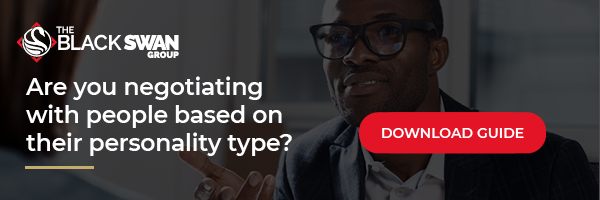The first time I ever handled a hostage negotiation, the whole thing was over in five minutes. I thought that negotiation was easy and that I was a natural.

But I was wrong. The very next one took five hours because the guy got frustrated with me. He was hanging out over an overpass, and I couldn’t understand why he was doing what he was doing.
At this point, I realized that my tactics weren’t working. So I switched things up and started listening to him. I found out his ex-girlfriend worked at the Kmart a few blocks down the street. He was going to take his own life because she wouldn’t let him see his son even though he’d given up drinking and drugs like he promised.
When I started listening to him and talking things out, the guy finally thanked me for helping him, and a team of firefighters brought him to safety.
The Power of Empathy
It was during this situation that I learned that empathy is the most underutilized negotiation skill of them all. Many people want to solve the problem. But not many of us want to build a relationship with the person on the other side of the table.
For far too many of us, when someone is saying something, we try to come up with a solution instead of actively listening to the conversation. Rather than letting the words actually land, we’re too busy thinking about what we’re going to say next, so much of what the other side says gets lost in the ether.
Successful negotiation is rooted in getting a better understanding of your counterpart’s position and what makes them tick. You don’t have to agree with them, but you do have to make sure that they know you’re listening to them and seeing things from their perspective.
At Black Swan, we talk about the power of Tactical Empathy™ and how today’s best negotiators and leaders use it to get better outcomes. When it boils down to it, people don’t care about how much you know until they know how much you care. And Tactical Empathy is the easiest way to show how much you care.
Tools for Becoming a Better Negotiator
Being a successful negotiator starts with actually wanting to do the job. Negotiation wears on you, and it’s not glamorous. If you’re not really into it, you’re not going to get good results. It’s that simple.
When your mind is in the right place and you come to the table, it’s time to unleash Tactical Empathy to make the other side feel understood right away. To do that, use Labels™ to identify (or misidentify) the unstated emotions or sentiments in the conversation, Mirrors™ to reflect the last few words your counterpart said, and Dynamic Silence™ to let your words marinate.
In the above example of the guy threatening to end his life, you might kick off the conversation with a Label like this: It seems like there’s a lot on your mind right now. At this point, the would-be jumper will respond: My ex-girlfriend won’t let me see my son. Then you respond with a Mirror—See your son?—and follow that up with Dynamic Silence to make sure the words land.
At this point, the floodgates start to open, and you’ll get the information you need to figure out the best way forward.
Practice Makes Perfect
If you’re opening a French book for the first time, the words will no doubt seem foreign to you. It’s the same with negotiation. You’re not going to knock it out of the park on your first day unless you get lucky like I did in my first hostage negotiation.
Negotiation is much like being a professional athlete. You need to work at it if you want to get to the next level.
The best part is that you can work on it every day. We always advise practicing your skills at your local coffee shop. But these days, that’s not always possible.
One of my favorite times to get some reps in is when I get a robocall. Maybe someone’s trying to sell me solar panels.
The next time you receive such a call, use Mirrors, Labels, and Dynamic Silence to get the salesperson off their script. That way, when you find yourself in a high-stakes negotiation, you’ll be able to lead with empathy while the skills come naturally to you—making it that much more likely you’ll get the best outcomes.
For more information on what you can do to win your next negotiation, check out our free guide, Three Negotiator Types, to learn more about the person sitting across the table.


